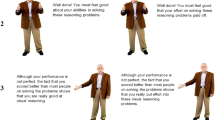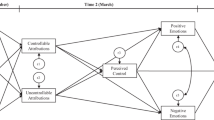Abstract
Both learned helplessness and reactance theories hypothesize that the effects of noncontingent reinforcement on later performance are related to the amount of experience with noncontingent reinforcement and to the subjects' expectations of control. In addition, learned helplessness theorists have suggested that performance may depend upon the causes to which subjects ascribe failure. The present study investigated these hypotheses by defining “expectation of control” as the degree of sex-role stereotypy and by assessing causal attributions. Forty men and 40 women were given either zero, three, four, five, or six discrimination problems for which they received noncontingent reinforcement; they were subsequently tested on anagrams and math problems. Causal attributions were rated after each set of tasks. The data suggested the following. (1) In general, under conditions of noncontingency, high masculinity subjects performed better on anagrams and low masculinity subjects performed worse on anagrams than subjects in the control conditions; stereotypic femininity was not related to performance. (2) Ratings of attributions for failing the discrimination problems were generally unrelated to performance, although there was weak support for the facilitating effects of effort attributions. (3) Subsequent to anagram and math performance, women rated external attributions higher following success and internal attributions higher following failure than did men. The implications for learned helplessness and reactance theories are discussed.
Similar content being viewed by others
References
Abramson, L. Y., Seligman, M. E. P., & Teasdale, J. D. Learned helplessness in humans: Critique and reformulation. Journal of Abnormal Psychology 1978, 87 49–74.
Bem, S. L. The measurement of psychological androgyny. Journal of Consulting and Clinical Psychology 1974, 42 155–162.
Brehm, J. W. A theory of psychological reactance. New York: Academic Press, 1966.
Dweck, C., & Bush, E. S. Sex differences in learned helplessness: I. Differential debilitation with peer and adult evaluators. Developmental Psychology 1976, 12 147–156.
Dweck, C., & Reppucci, N. D. Learned helplessness and reinforcement responsibility in children. Journal of Personality and Social Psychology 1973, 25 109–116.
Frieze, I. H., Whitely, B. E., Hanusa, B. H., & McHugh, M. C. Assessing the theoretical models for sex differences in causal attributions for success and failure. Sex Roles 1982, 8 333–342.
Gatchel, R. J., & Proctor, J. D. Physiological correlates of learned helplessness in man. Journal of Abnormal Psychology 1976, 85 27–34.
Graham, J., & Gannon, L. Learned helplessness and attributions: The effects of contingency, outcome, and sex. Unpublished manuscript, 1979.
Griffith, M. Effects of noncontingent success and failure on mood and performance. Journal of Personality 1977, 45 442–457.
Hiroto, D. S., & Seligman, M. E. P. Generality of learned helplessness in man. Journal of Personality and Social Psychology 1975, 32 311–327.
Janoff-Bulman, R. Characterological versus behavioral self-blame: Inquiries into depression and rape. Journal of Personal and Social Psychology 1979, 37 1798–1809.
Klein, D. C., Fencil-Morse, E., & Seligman, M. E. P. Learned helplessness, depression, and the attribution of failure. Journal of Personality and Social Psychology 1976, 33 508–516.
Kuiper, N. A. Depression and causal attributions for success and failure. Journal of Personality and Social Psychology 1978, 36 236–246.
Levine, M. Hypothesis behavior by humans during discrimination learning. Journal of Experimental Psychology, 1966, 71 331–338.
Miller, I. W., & Norman, W. H. Learned helplessness in humans: A review and attribution-theory model. Psychological Bulletin 1979, 86 93–118.
Miller, R. G. Simultaneous Statistical Inference. New York: McGraw-Hill, 1966.
Miller, W. R., & Seligman, M. E. P. Learned helplessness, depression and the perception of reinforcement. Behavior Research and Therapy 1976, 14 7–17.
Peterson, C., Schwartz, S., & Seligman, M. Self-blame and depressive symptoms. Journal of Personality and Social Psychology 1981, 41 253–259.
Pittman, N. L., & Pittman, T. S. Effects of amount of helplessness training and internal-external locus of control on mood and performance. Journal of Personality and Social Psychology 1979, 37 39–47.
Rizley, R. Depression and distortion in the attribution of causality. Journal of Abnormal Psychology 1978, 87 32–48.
Roth, S., & Bootzin, R. Effects of experimentally induced expectancies of external control: An investigation of learned helplessness. Journal of Personality and Social Psychology 1974, 29 253–264.
Seligman, M. E. P. Helplessness: On depression, development, and death. San Francisco: Freeman, 1975.
Thornton, J. W., & Jacobs, P. D. Learned helplessness in human subjects. Journal of Experimental Psychology 1971, 87 369–372.
Weiner, B., & Sierad, J. Misattribution for failure and the enhancement of achievement strivings: A preliminary report. In B. Weiner (Ed.), Achievement motivation and attribution theory. Morristown, N.J.: General Learning Press, 1974.
Wortman, C. B., & Brehm, J. W. Responses to uncontrollable outcomes: An integration of reactance theory and the learned helplessness model. In L. Berkowitz (Ed.), Advances in experimental social psychology (Vol. 8). New York: Academic Press, 1975.
Author information
Authors and Affiliations
Additional information
The authors would like to thank Stephen Haynes and Jack McKillip for their helpful comments on earlier versions of this paper.
Rights and permissions
About this article
Cite this article
Gannon, L., Heiser, P. & Knight, S. Learned helplessness versus reactance: The effects of sex-role stereotypy. Sex Roles 12, 791–806 (1985). https://doi.org/10.1007/BF00287872
Issue Date:
DOI: https://doi.org/10.1007/BF00287872




